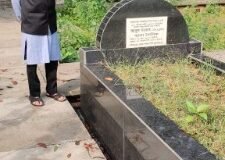
Rayhan Ahmed Topader:
Instead of looking forward to the pre-dawn Ramadan meal of suhoor, Dr Firas al-Jundi was cradling his scared children and surveying the damage done to his home by Syrian government airstrikes. At least 11 people died in the overnight bombing on Wednesday of Maaret al-Numan in Idlib province, the Syrian opposition’s last stronghold in the country, in the latest spasm of violence in an escalated campaign on the area by Bashar al-Assad’s forces. Most of his home’s windows had been broken, but Jundi’s family escaped shaken but safe. Arriving at his hospital, he immediately began triaging more than 50 injured people. “We are dealing with huge numbers of head injuries, amputations, paralysis cases,” he told the Guardian by phone. Routine procedures are on hold. Idlib and the surrounding countryside are supposedly covered by a de-escalation deal brokered by Russia and Turkey last autumn, which saved the area from an impending regime assault. It has unravelled since January, when control of the area was wrested from more moderate rebel groups by the hardline Hayat Tahrir al-Sham (HTS).Unlike the scorched earth campaigns in Aleppo, Ghouta and other areas clawed back by Assad with help from his Russian allies, Idlib has been subjected to a limited ground campaign accompanied by airstrikes, carried out under the pretext of destroying HTS.The end of Ramadan has brought no respite in the fighting.
More than 270,000 people have been displaced in recent weeks, leaving thousands to celebrate Eid with what little they have left under sheets stretched over the branches of olive trees. At least 25 hospitals and other critical infrastructure such as civil defence rescue centres have been targeted in what dozens of prominent doctors have said is a blatant breach of international humanitarian law. In May, 5,400 airstrikes killed at least 316 people, according to the Syrian Observatory for Human Rights. Medical workers in Idlib said on Monday they would no longer share the locations of hospitals and clinics with the United Nations after doing so failed to stop them becoming Syrian and Russian targets. At least nine facilities whose coordinates were passed on to Moscow in an effort to protect them have come under fire in the last month. Russia blocked a security council statement criticising the Syrian government campaign on Idlib, the second such move by the delegation since the escalation began on 30 April. Russia said the proposed statement was unbalanced because it did not mention the Syrian towns of Hajin or Baghuz, where it says civilians have suffered during US-backed fighting against Islamic State, according to Agence France-Presse. Russia has also rejected a tweet from the US president, Donald Trump, demanding Russia and Syria “stop bombing the hell out of Idlib and indiscriminately killing innocent civilians.
The Kremlin press spokesman, Dmitry Peskov, said it was “unacceptable” to expect Moscow and Damascus not to retaliate against rebel and HTS shelling of government areas and Russian military bases. Like the rest of Syria’s rebel-held Idlib province on Tuesday, the 21-year-old student was celebrating the end of Ramadan. However, instead of visiting relatives, Akhtib, her parents and three younger brothers did not leave the basement below the family home. The Syrian president’s warplanes were still in the sky and it was too dangerous to go outside. We spent last night in the basement with our neighbours,” Akhtib said over the phone from her home in Kafranbel. “A rocket hit a house in our neighbourhood and the fire almost spread to our house. My brothers can’t go out and play. But I’m going to wear my Eid clothes and try to be happy. I don’t have a choice.” Hundreds of people have left the town, which has been heavily targeted during the last five weeks in a ferocious aerial campaign on Syria’s last rebel stronghold by Bashar al-Assad and his Russian allies. Market streets that should be full of people buying and selling traditional Eid sweets have been empty for the last few days, Akhtib said. Also an air-to-surface missile hit a market in the town of Maarat al-Numan, killing three people and injuring 11, a doctor said. In Kafranbel, a boy already dressed in his finest clothes in preparation for Eid was killed in the attack that almost destroyed the Akhtib family home.
Over the holy month of Ramadan our cities have been completely destroyed and people have had to abandon their homes. Their planes are always in the air, said Othman al-Othman, a 25-year-old civil defence service volunteer from Kafranbel. Idlib’s population has swollen from 1 million to about 3 million since Syria’s war broke out in 2011 and the province is the last opposition area that remains outside Assad’s control. A ceasefire brokered last September to avert what aid agencies warned would be the worst humanitarian crisis in the already bloody war has been shattered, after control of Idlib was seized by the hardline Islamist group Hayat Tahrir al-Sham (HTS). Damascus and Moscow say the HTS takeover legitimises the campaign against Idlib as they are targeting terrorists not covered by the ceasefire deal.
Israel has carried out airstrikes in Syria in response to rare rocket fire from the neighbouring country. A war monitor reported that 10 people were killed, including Syrian soldiers and foreign fighters. Israel’s army said two rockets were fired from Syria at Mount Hermon, in the Israeli-occupied Golan Heights, late on Saturday and one was located within Israeli territory. In response, the army attacked two Syrian artillery batteries, a number of observation and intelligence posts on the Golan Heights and an SA-2 aerial defence battery, it said. The Israeli attack left three Syrian soldiers and seven foreign fighters dead, the Syrian Observatory for Human Rights said.
According to the UK-based monitor, they died in missile strikes close the capital, Damascus, where Syrian troops. Iranian forces and Hezbollah fighters are stationed. The observatory did not specify the nationality of the foreign fighters killed. Syria’s official news agency Sana quoted a military source as saying anti-aircraft defences fired against enemy missiles from Israel targeting positions in south-west Damascus. The Israeli army said its own aerial defence systems were activated due to the Syrian anti-aircraft fire, but none of the Syrian fire hit Israel. The Israeli prime minister, Benjamin Netanyahu, said he had ordered the strike. Israel has carried out hundreds of airstrikes in Syria, most of them against what it says are Iranian and Hezbollah targets. Israel says it is determined to prevent its arch-foe Iran from entrenching itself militarily in Syria, where Tehran backs President Bashar al-Assad in the country’s eight-year war, which has killed more than 370,000 people. Israel insists it has the right to continue to target positions in Syria held by Iran and its Lebanese ally Hezbollah out of self-defence. On 27 May, Syria said Israel carried out a missile attack in Quneitra. The Israeli army said it was retaliation for anti-aircraft fire targeting one of its fighter jets. Syrian air defence batteries intercepted projectiles from Israel and downed a number of them on 17 May, according to Sana. The Syrian province of Quneitra includes the Golan Heights, most of which is occupied and annexed by Israel.
In January, Israel hit Iranian positions in Syria in response to missile fire. According to the observatory, 21 people, mainly Iranians, were killed in those raids. The latest reported strike comes at a time of rising tensions between Iran and the US. The standoff has been simmering since the US withdrew from the 2015 nuclear treaty between Iran and world powers. In recent weeks the US has accused Iran of alleged threats and deployed an aircraft carrier group and B-52 bombers to the Gulf.
Neighbouring Turkey, which backs Idlib’s rebel groups, faces the dilemma of whether or not to absorb any fleeing refugees. Turkey is already home to 3.6 million Syrians and the government is unwilling to provide shelter for potentially millions more. Aid agencies warned before the ceasefire was brokered last year that an assault on Idlib would put the lives of 3 million civilians in danger and trigger the worst humanitarian disaster of the war to date. Originally home to about 1 million people, Idlib’s population has swollen with civilians displaced by fighting elsewhere in the country, and there is now nowhere else left for them to go unless Turkey opens its border.The World Health Organization says 18 hospitals in Idlib have been targeted and destroyed by regime bombing and at least 223 people have been killed since 20 April, monitors say. More than 200,000 people have been displaced from their homes by the renewed violence and the majority of aid funding and support has dried up as several organisations halted their work in the area after the HTS takeover.
Idlib is a bargaining chip at this point and it’s extremely difficult to anticipate what happens next,” said Dareen Khalifa, a senior Syria analyst for the International Crisis Group. Turkey is maintaining its observation posts in Idlib and has 1,200 troops on the ground there. They don’t show any signs of budging yet. At the same time, Russia can continue to push very hard in Idlib because it strengthens their hand when negotiating with Turkey on other issues. Sad as it sounds, given the humanitarian cost, all parties are going to continue to try and destabilise the others.
Writer and Columnist
 Weekly Bangla Mirror | Bangla Mirror, Bangladeshi news in UK, bangla mirror news
Weekly Bangla Mirror | Bangla Mirror, Bangladeshi news in UK, bangla mirror news





